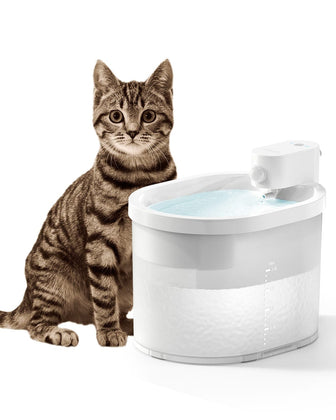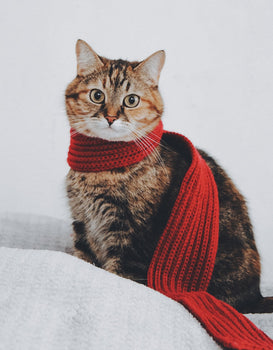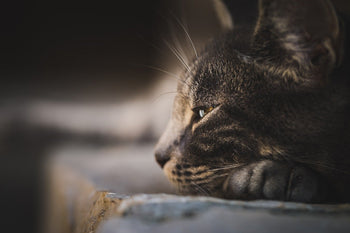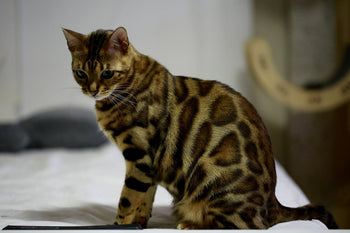Cats are known for throwing up, but it can be concerning when they vomit undigested food. This is a common issue among feline pets that can be caused by various factors. As a responsible pet owner, it is essential to understand the reasons behind this behavior to prevent it from happening in the future.
One of the primary causes of cats throwing up undigested food is overeating. Cats have a small stomach, and when they eat too much, they tend to vomit the undigested food. Another reason could be eating too fast, which can cause food to come back up undigested. In some cases, cats may have an underlying medical condition that causes them to vomit undigested food.
Why Is My Cat Throwing Up Undigested Food: Causes and Solutions
Key Takeaways
Overeating and eating too fast are common causes of cats throwing up undigested food.
Medical conditions such as gastrointestinal issues or hairballs can also cause this behavior.
Preventing overeating, feeding smaller meals, and seeking veterinary care when necessary can help manage and prevent this issue.
Causes of Throwing Up Undigested Food
Cats may throw up undigested food for various reasons. Here are some common causes to consider:

Eating Too Quickly
Cats that eat too quickly can vomit undigested food soon after eating. This is because their stomachs may not have enough time to break down the food properly. To prevent this, you can try feeding smaller portions more frequently throughout the day or using a slow feeder bowl.
Hairballs
Hairballs are a common cause of vomiting in cats. When cats groom themselves, they ingest loose hair, which can accumulate in their stomachs and form hairballs. If your cat is throwing up hairballs, you can try brushing them regularly to remove loose hair and using hairball prevention products.
Food Intolerance
Some cats may have food intolerances or allergies that can cause them to vomit undigested food. If you suspect that your cat has a food intolerance, you can try switching to a different type of food or consulting with your veterinarian.
Underlying Health Issues
In some cases, throwing up undigested food can be a sign of an underlying health issue, such as gastrointestinal problems or kidney disease. If your cat is vomiting frequently or showing other signs of illness, it is important to seek veterinary care.
Related Posts:
Prevention and Management
Feeding Practices
One of the most important things you can do to prevent your cat from throwing up undigested food is to ensure they are eating at a slower pace. This can be achieved by giving them smaller, more frequent meals throughout the day instead of one or two large meals. You can also try feeding them from a puzzle feeder or a slow feeder bowl to encourage them to eat more slowly. Additionally, make sure to provide fresh water at all times, and consider investing in a wireless cat water fountain to encourage your cat to drink more water.
Hairball Remedies
If your cat is prone to hairballs, it's important to take steps to manage them. Regular grooming can help reduce the amount of hair your cat ingests, and there are also hairball remedies available such as special diets, treats, and supplements. You can also try giving your cat a small amount of petroleum jelly or a hairball remedy paste to help lubricate their digestive system and make it easier for them to pass hairballs.
Dietary Changes
If your cat is consistently throwing up undigested food, it may be time to make some dietary changes. Consider switching to a high-quality, easily digestible cat food that is free from artificial colors and flavors. You may also want to try a limited ingredient diet, which can help identify any food sensitivities or allergies your cat may have. Finally, talk to your veterinarian about whether a prescription diet may be necessary to address any underlying health issues.
Related Posts:

When to Seek Veterinary Care
If a cat is consistently throwing up undigested food, it is important to monitor their behavior and recognize any red flags that may indicate a need for veterinary care. Early intervention can prevent more serious health issues down the line.
Recognizing Red Flags
If a cat is showing any of the following symptoms, it is important to seek veterinary care:
Vomiting multiple times a day or for several days in a row
Loss of appetite
Lethargy or lack of energy
Diarrhea
Blood in vomit or stool
Difficulty breathing or panting
Signs of pain or discomfort, such as vocalization or hiding
Monitoring Behavior
Owners should monitor their cat's behavior and keep track of any changes in their eating, drinking, or bathroom habits. If a cat is consistently throwing up undigested food, it may be a sign of an underlying health issue that needs to be addressed.
Importance of Early Intervention
Early intervention is key when it comes to addressing a cat's health issues. If left untreated, vomiting and other symptoms can lead to more serious health issues down the line. It is important to seek veterinary care as soon as possible to ensure the best possible outcome for your cat's health.
Conclusion
In conclusion, vomiting undigested food can be a common occurrence in cats and is usually not a cause for concern. However, if it happens frequently or is accompanied by other symptoms such as lethargy or loss of appetite, it is important to seek veterinary attention.
Possible causes of vomiting undigested food in cats include eating too quickly, overeating, dietary changes, and hairballs. It is important to monitor your cat's eating habits and provide them with a balanced diet to prevent these issues.
Additionally, providing your cat with plenty of water and encouraging them to stay hydrated can help prevent vomiting. Regular grooming and hairball prevention measures can also help reduce the frequency of vomiting in cats.
Overall, while vomiting undigested food may be concerning for cat owners, it is often a minor issue that can be addressed through simple changes in diet and lifestyle.

Frequently Asked Questions
What could be causing my older cat to vomit undigested food?
There are several reasons why an older cat may vomit undigested food. One common reason is that the cat may be eating too quickly, causing them to swallow air along with their food. This can lead to regurgitation of undigested food shortly after eating. Other reasons may include food allergies or intolerances, gastrointestinal disorders, or dental problems.
Is it normal for a cat to vomit yellow bile along with undigested food?
It is not uncommon for a cat to vomit yellow bile along with undigested food. This can happen when a cat's stomach is empty and the bile irritates the stomach lining, causing vomiting. However, if this happens frequently, it may be a sign of an underlying medical condition and should be evaluated by a veterinarian.
How can I prevent my cat from vomiting after meals?
To prevent vomiting after meals, it is important to ensure that your cat is eating slowly and not gulping down their food. You can also try feeding smaller, more frequent meals throughout the day instead of one or two large meals. Additionally, make sure your cat has access to fresh water at all times and is not eating food that is past its expiration date.
What should I do if my cat is frequently vomiting dry food?
If your cat is frequently vomiting dry food, it may be a sign of an underlying medical condition. It is important to take your cat to the veterinarian for an evaluation. The veterinarian may recommend a change in diet or prescribe medication to help manage the vomiting.
At what point should vomiting in cats be a cause for concern?
Vomiting in cats can be a normal occurrence, but if it happens frequently or is accompanied by other symptoms such as lethargy, loss of appetite, or diarrhea, it may be a cause for concern. If you notice any of these symptoms, it is important to take your cat to the veterinarian for an evaluation.
Why might a cat vomit undigested food despite appearing healthy otherwise?
There are several reasons why a cat may vomit undigested food despite appearing healthy otherwise. This may include eating too quickly, food allergies or intolerances, gastrointestinal disorders, or dental problems. It is important to take your cat to the veterinarian for an evaluation to determine the underlying cause of the vomiting.

















